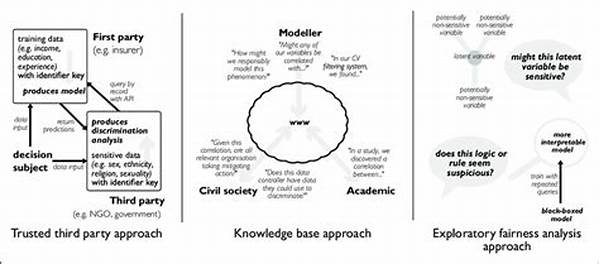Fairness-Aware Machine Learning Models
In the rapidly evolving world of technology and data, fairness-aware machine learning models are rewriting the rules of the game. As organizations and individuals increasingly rely on machine learning for making critical decisions, the fairness of these models has become a central topic of discussion. With the power to make life-changing decisions, from loan approvals to job recruitments, these models can inadvertently replicate or even amplify existing societal biases. This issue has brought about a pressing need for fairness-aware machine learning models that ensure decisions are equitable across different demographics.
Imagine this: a world where every data-driven decision you encounter, from your morning news feed to life insurance evaluations, respects and values fairness. That world is closer than ever because AI teams are working tirelessly to make fairness not just a feature but a foundation. These fairness-aware machine learning models are like referees in the game of AI—ensuring every call is just, making life not only more accessible but equitable for all players. Yet, the journey to this equitable playing field is riddled with challenges, requiring the ingenuity and creativity of scientists and ethicists globally. They work to craft models that are not only aware of biases but actively counteract them.
The Need for Fairness in Machine Learning
The importance of fairness-aware machine learning models is not just a moral obligation but a business necessity. Companies employing such models are poised to win customer trust and achieve compliance with potential regulations aiming to eliminate discrimination. By embracing fairness-aware models, businesses can ensure that their decisions don’t alienate users but rather foster a more inclusive relationship with their clientele.
To see the power of fairness-aware models in action, consider the case of an HR software company that implements such models to ensure unbiased recruitment processes. By reducing reliance on biased historical data and instead focusing on candidate potential and diversity, this company significantly reduces turnover rates and boosts productivity. This strategy not only benefits society but also drives substantial economic value, illustrating how fairness in machine learning isn’t just a social contrivance but a robust business strategy.
Discussion on Fairness-Aware Machine Learning Models
The concept of fairness-aware machine learning models is crucial in today’s data-driven society. With AI systems becoming integral in decision-making processes, ensuring equity and eliminating bias is paramount. This discussion centers on the various efforts and challenges in achieving fairness in machine learning, demonstrating the need for innovation and thought leadership in this field.
How Bias Affects Machine Learning
Bias in machine learning can emerge from various sources, including historical data, model architectures, and feature selection. Such biases can lead to discriminatory outcomes, affecting decisions in hiring, lending, and law enforcement. For instance, models trained on historical hiring data may inadvertently favor certain demographic groups over others due to entrenched societal inequalities. This can perpetuate cycles of inequity, highlighting the urgent need for fairness-aware machine learning models designed to mitigate these biases.
Strategies for Implementing Fairness
To build fairness-aware machine learning models, one must prioritize diverse perspectives and datasets. This involves engaging stakeholders across different backgrounds and refining data collection methods to capture a comprehensive spectrum of societal nuances. Implementing algorithmic techniques that counteract bias—such as reweighing, adversarial debiasing, and fairness constraints—is key. These methods help ensure that the model’s decisions are not only accurate but equitable.
Industry Collaboration and Policy Making
Collaboration between industries and policymakers is vital to fostering fairness in machine learning. By setting standards and implementing regulatory frameworks, policymakers can guide organizations toward accountability and transparency in AI development. This collaboration also ensures that businesses using AI technologies can operate within a fair and ethical framework, ultimately protecting consumers and maintaining trust.
Case Studies and Success Stories
Many companies have successfully implemented fairness-aware machine learning models, showcasing the tangible benefits of integrating fairness into their systems. One such example is an online retail company that redesigned its recommendation algorithms to eliminate cultural biases and saw a substantial increase in customer satisfaction and global reach. Stories like these demonstrate that fairness is not only achievable but also beneficial for business growth and consumer trust.
Efforts to Enhance Fairness
Ensuring fairness in machine learning is a complex, multi-faceted challenge requiring continuous innovation and vigilance. By adopting fairness-aware machine learning models, organizations can not only improve decision accuracy but also uphold moral obligations towards society, ultimately contributing to a fairer and more inclusive future.
Understanding Fairness-Aware Machine Learning Models
In the quest for ethical AI, understanding the intricacies of fairness-aware machine learning models is paramount. These models, meticulously crafted to recognize and counteract inherent biases, exemplify the intersection of technology, ethics, and humanity. They solve a fundamental issue: ensuring everyone gets a fair deal when algorithms determine significant aspects of their lives.
As machine learning becomes more deeply ingrained in our society, the push for fairness reminds us that technology should serve humanity, not hinder it. These fairness-aware machine learning models represent a commitment to ethical innovation, ensuring that as we advance technologically, we also progress ethically. In doing so, they not only enhance the accuracy and reliability of decisions but also restore trust in the systems we rely on daily.
Seven Key Features of Fairness-Aware Machine Learning Models
Embracing Fairness in AI
Fairness-aware machine learning models are at the heart of building a just society in a world intertwined with advanced technology. As algorithms become gatekeepers to opportunities, fair AI practices balance the scales, ensuring that every individual is judged by merits, not biases. Embracing fairness in AI isn’t just a choice; it’s an obligation for ethical stewardship.
The journey to fairness requires collective effort across sectors, demanding transparency, collaboration, and a steadfast commitment to justice. Leveraging fairness-aware practices not only bolsters organizations’ credibility but also enriches the technology landscape with equitable solutions. As AI’s role grows, so must our dedication to principles that guide it—principles that fairness-aware machine learning models embody with remarkable promise.

